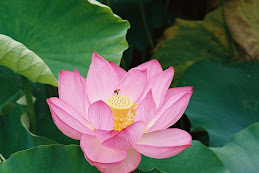That quote has absolutely no religious or philosophical root. It's from the movie "Austin Powers" when Dr. Evil tells Austin that they are really quite the same (the joke in the film being that both roles are played by Mike Myers). But, this was the first quote to pop into my head when I started learning about the Buddhism as being Interfaith.
It's kind of like all religions began as a family - born from the same place. Then, your brothers and sisters go off and they become their own people, moving away, starting their lives, and having children who do the same. Each of them had their own way of doing things, traditions and customs, but they all came from the same place. And it's really quite true of religion. Which, I think, is why you can be a follower of Buddhist principles either on their own, or even as a supplement to your own religion, whatever that may be.
When I look in my bathroom, I don't have just medicines. I have some vitamins and supplements too. I don't have to have one or the other. I can have some Tylenol Cold and Flu AND some Vitamin C tablets. I can have Ibufrofen AND Fish Oil tablets. Mix it up - just like mixing up traditions from the various aspects of religions to what works for you.
Sure,t here's going to be people who are going to say that when you do that mixing you end up with a salad of sorts (i love that metaphor), but you know what? I love salad. So, nothing wrong with that from where I stand.
This is a great time for one of Buddha's most quoted sayings:
"Don't believe a teaching just because you've heard it from a man who's supposed to be holy, or because it's contained in a book supposed to be holy, or because all your friends and neighbors believe it. but whatever you've observed and analyzed for yourself and found to be reasonable and good, then accept that and put it into practice."
So much of what we argue about theologically all began the same way, just taking detours over the years that changed or altered it. But so many times we are too egocentric to see otherwise.
It's this ego, this sense of self ("It's all about me - I'm right!" mentality) that is getting in the way of seeing how we are all coming from the same place. Buddha said we all one with the universe, and religion itself is no exception. When I realized this, in all its simplicity, it nearly blew my mind. Here I was, having grown up Roman Catholic that my attraction and interest to Eastern beliefs meant a complete avoidance and dropping of any previous beliefs I had been taught.
Not true.
It's finding the commonality for what you, personally, feel to be right - be it from what you've known, or in my case, what I'm growing to know, and realizing it's all coming from the same place.
So, lose the sense of self. Lose the ego. Don't get caught up in the drama surrounding ourselves. Forget it. Move on and see the bigger picture.
You'll be happier for it.
Summer Transitions - An Update
10 years ago

